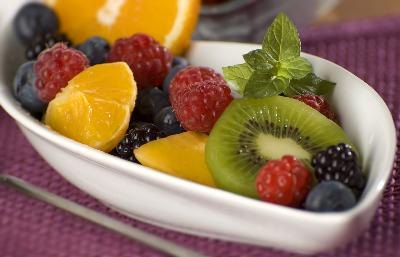
To shed pounds, you must create a caloric deficit by burning more calories than you eat each day. To lose 1 to 2 pounds per week, you must burn 500 to 1,000 calories more than you consume per day. Substituting fruit for higher-calorie foods at breakfast can help you control your caloric intake, and eating fruit as part of a fiber and protein-rich breakfast can keep you full for longer, increasing your ability to perform physical activity throughout the day.
Significance of Breakfast
Adults who begin their day with a healthy breakfast are more likely to control their weight, according MayoClinic.com. Skipping breakfast may make you more likely to reach for unhealthy snacks later in the morning. Morning fasting can also alter your metabolism, causing you to store more fat and gain weight. Eating breakfast can make you more likely to consume less fat and cholesterol, consume more foods rich in vitamins and minerals and have better concentration throughout the morning, says MayoClinic.com.
Healthy Breakfast Components
A healthy breakfast has multiple components, including whole grains, low-fat protein, low-fat dairy and fresh fruits and vegetables. This combination of food groups provides fiber, protein, complex carbohydrates and some fat, allowing you to stay full for hours. Try reducing the size of your cereal or other grain serving and adding some fresh fruit, such as bananas, peaches or berries, suggests the Centers for Disease Control and Prevention. With more fruit and less grain, you will fill up with fewer calories. If fruit accounts for your entire breakfast, however, you may not have enough protein and fiber to stay full throughout the morning, leaving you more vulnerable to unhealthy snacking.
Fruit Energy Density
Fruits have a naturally high water content and low energy density, making them good choices to fill you up with fewer calories, according to MayoClinic.com. The fiber found in fruits can also help provide a feeling of fullness. Low-calorie fruits include cantaloupe, honeydew melon, pineapple, strawberries and tangerines, with 50 calories each per serving, and peaches, nectarines and grapefruit, with 60 calories each per serving, according to the FDA. These fruits all contain 1 to 2 g of dietary fiber per serving.
Fruit Health Benefits
Eating fruit can benefit your health in several ways in addition to helping you control your weight. Fruits provide good sources of nutrients such as potassium, vitamin C, vitamin A, calcium and iron. Maintaining a healthy diet rich in fresh fruits and vegetables can help you reduce your risk of diseases such as heart disease, stroke, type 2 diabetes and mouth, stomach and colon cancer, according to the USDA. Potassium-rich foods such as fresh fruits can help slow bone loss and lower the risk of kidney stones, according to the USDA.





No comments:
Post a Comment